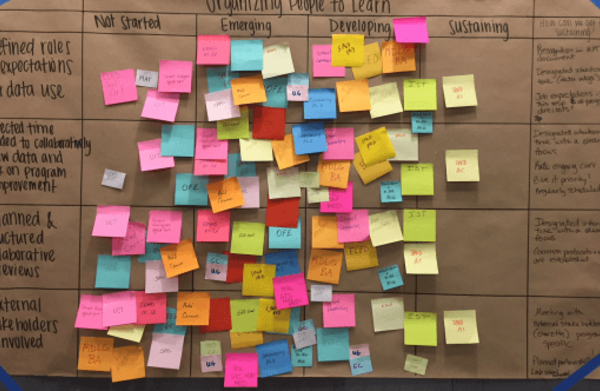Posted on
Working in common to build the Common Indicators System Network
Category: Data
There’s a common narrative that so-called “traditional” teacher-preparation programs are resistant to change, and that “alternative” providers are the only hope for genuine innovation in educator preparation. For many, the field is a place of stark dichotomies, with an “us versus them” mentality.
At Deans for Impact, we don’t buy it.
Our experience is that leaders throughout educator preparation want to do better by the future teachers and students they serve. These leaders are committed to changing the status quo — and they come from both “traditional” and alternative programs. But to fulfill this commitment, these leaders need access to data that helps them understand what’s working and what needs to improve – and they need to know how to translate that data into actionable insights for program improvement.
For the last two years, more than 50 faculty and program leaders from 12 educator-preparation programs have worked in partnership with Deans for Impact on this challenge, joining together to collectively investigate how to better prepare aspiring teachers through what we’re calling the Common Indicators System (CIS) Network. These leaders identified categories of data to collect, selected common instruments to gather these data, and developed shared implementation protocols to enable meaningful comparisons across different program contexts.
Over this past academic year, the CIS Network has collected data on more than 3,500 teacher candidates, 500 program graduates, and 100 employers across four common indicators. To our knowledge, it’s one of the largest cross-institutional research efforts ever undertaken in educator preparation. And, it’s research designed to help programs improve their effectiveness.
Participants in the CIS Network are now gearing up for our first-ever Inquiry Institute, where they’ll engage in cross-institutional inquiry into these data and develop plans to inform improvement when they return to their institutions. Teams of leaders from so-called traditional programs will work together with alternative providers to learn from each other.
The three-day Institute will support participants in examining CIS data and enacting promising data use practices when they return to campus. Teams will use a “shared inquiry tool” to explore CIS data, which will allow them to look at their data compared to the Network overall and to similar programs and candidates. At the end of the Institute, each team will have identified areas for growth, developed plans for working with colleagues to address those areas, and received a suite of tools to support them in carrying out their work.
After the Inquiry Institute concludes, Deans for Impact will continue to support participating teams in building cultures of evidence-informed teacher preparation in their institutions. Existing and new CIS Network members will continue to gather data in the coming academic year, thereby creating a cross-institutional, longitudinal data set on candidate knowledge and skill and program performance. This data set will only become more powerful over time as it incorporates additional years of data from a growing network of different programs.
The CIS Network is proof that different educator-preparation programs can come together to examine the features of teacher preparation that matter, for whom, and under what conditions — and do so in ways that should help the entire field of educator preparation understand how to better prepare future teachers. If you’re interested in joining the Network to learn from colleagues and help improve through evidence, get in touch with us!
Related Stories:

Blog
Bringing the work of the CIS Network back to campus
This post is the third in a three-part series by Common Indicators System Network participants...
July 26, 2018
Blog
Amplifying the culture of inquiry at UTRGV through the Common Indicators System Network
This post is the second in a three-part series by Common Indicators System Network participants...
July 25, 2018

Blog
Exploring important questions through the CIS Network
What do pre-service teachers need in order to develop excellent classroom management skills?
July 24, 2018




